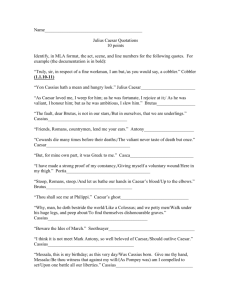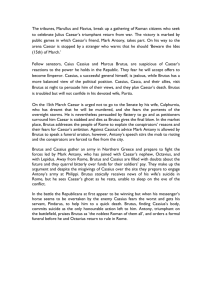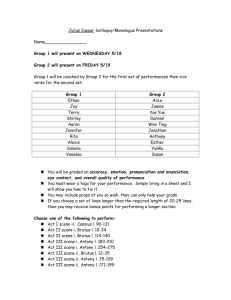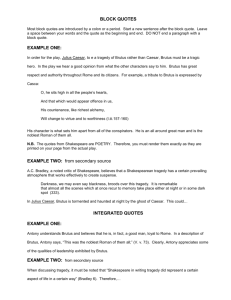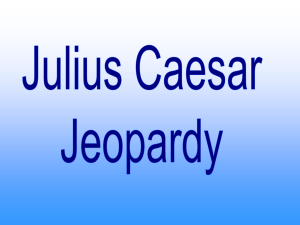Shakespeare`s Julius Caesar
advertisement
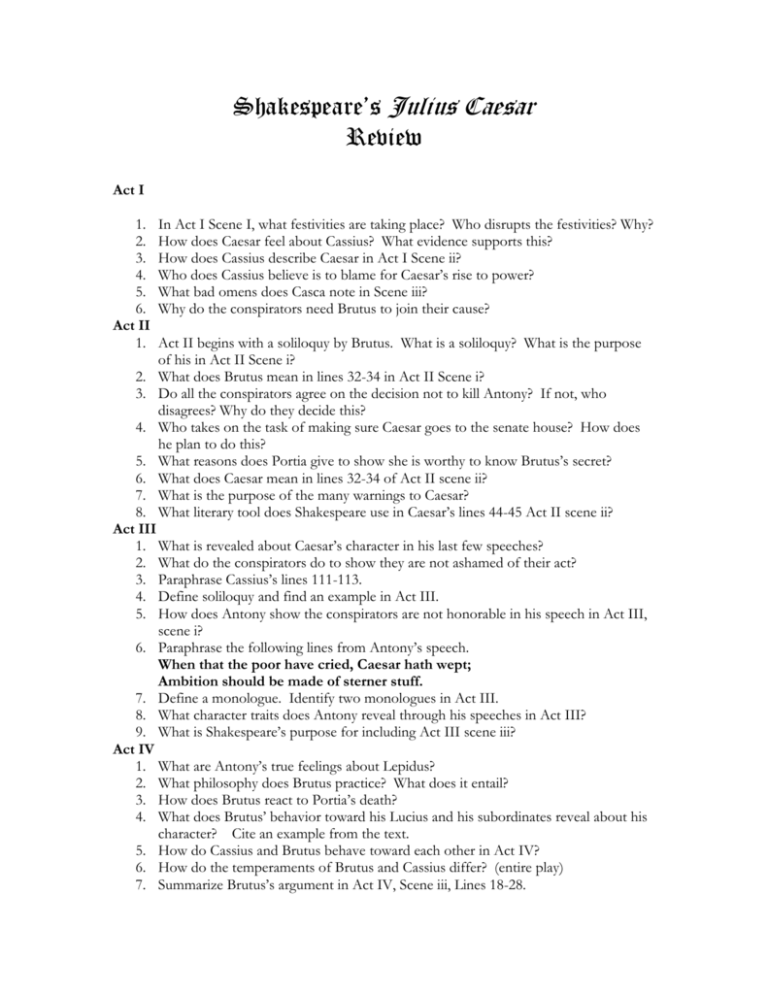
Shakespeare’s Julius Caesar Review Act I 1. 2. 3. 4. 5. 6. Act II 1. 2. 3. 4. In Act I Scene I, what festivities are taking place? Who disrupts the festivities? Why? How does Caesar feel about Cassius? What evidence supports this? How does Cassius describe Caesar in Act I Scene ii? Who does Cassius believe is to blame for Caesar’s rise to power? What bad omens does Casca note in Scene iii? Why do the conspirators need Brutus to join their cause? Act II begins with a soliloquy by Brutus. What is a soliloquy? What is the purpose of his in Act II Scene i? What does Brutus mean in lines 32-34 in Act II Scene i? Do all the conspirators agree on the decision not to kill Antony? If not, who disagrees? Why do they decide this? Who takes on the task of making sure Caesar goes to the senate house? How does he plan to do this? What reasons does Portia give to show she is worthy to know Brutus’s secret? What does Caesar mean in lines 32-34 of Act II scene ii? What is the purpose of the many warnings to Caesar? What literary tool does Shakespeare use in Caesar’s lines 44-45 Act II scene ii? 5. 6. 7. 8. Act III 1. What is revealed about Caesar’s character in his last few speeches? 2. What do the conspirators do to show they are not ashamed of their act? 3. Paraphrase Cassius’s lines 111-113. 4. Define soliloquy and find an example in Act III. 5. How does Antony show the conspirators are not honorable in his speech in Act III, scene i? 6. Paraphrase the following lines from Antony’s speech. When that the poor have cried, Caesar hath wept; Ambition should be made of sterner stuff. 7. Define a monologue. Identify two monologues in Act III. 8. What character traits does Antony reveal through his speeches in Act III? 9. What is Shakespeare’s purpose for including Act III scene iii? Act IV 1. What are Antony’s true feelings about Lepidus? 2. What philosophy does Brutus practice? What does it entail? 3. How does Brutus react to Portia’s death? 4. What does Brutus’ behavior toward his Lucius and his subordinates reveal about his character? Cite an example from the text. 5. How do Cassius and Brutus behave toward each other in Act IV? 6. How do the temperaments of Brutus and Cassius differ? (entire play) 7. Summarize Brutus’s argument in Act IV, Scene iii, Lines 18-28. 8. Why does Brutus admit he is angry with Cassius? 9. Describe the plan Brutus proposes for their army. What are his reasons? How does Cassius feel about it? Why? 10. What is the significance of the ghost appearing to Brutus in Act IV, Scene iii? 11. When does Brutus realize he was wrong to kill Caesar? Act V 1. Describe the meeting between Brutus, Cassius, Antony, and Octavius at the beginning of Act V. 2. Paraphrase lines 45-47 Scene i. What/who does Cassius blame for Antony’s offense? 3. Describe the behavior of Cassius and Brutus before they depart for battle in Scene i. 4. To whom or what does Brutus attribute the suicides of Cassius and Titinius? 5. Cite an example of Brutus practicing his philosophy in Act V, Scene iii. 6. Why does Lucilius claim to be Brutus during battle? 7. What is significant about the death of Brutus in Act V, Scene v? General Questions 1. Plot- Describe the play with details from the story in the following parts: a. Exposition: b. Rising Action: c. Climax d. Falling action e. Resolution 2. Define a tragedy. Why is this play considered a tragedy? 3. Define a tragic hero. Explain why each of the following is or is not a tragic hero. a. Brutus b. Cassius c. Caesar 4. Define blank verse. How does Shakespeare use it in the play? 5. Define theme. What is the theme of The Tragedy of Julius Caesar?

